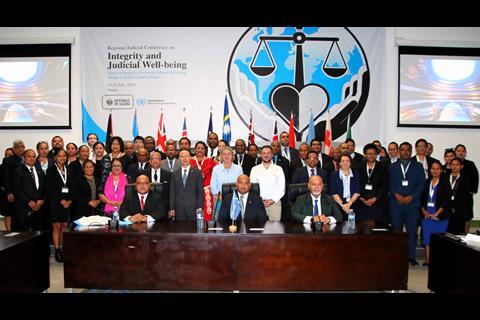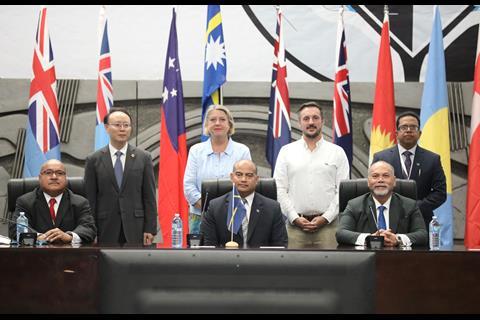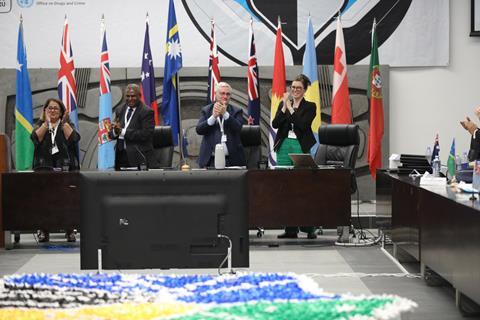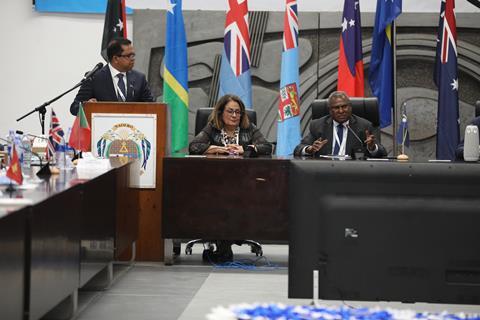A new declaration could herald the establishment by the United Nations of an International Judicial Wellbeing Day
Judicial wellbeing has come under the spotlight in recent years. In the 2022 UK Judicial Attitude Survey, one in 10 judges reported bullying. The judiciary published a ‘statement of expected behaviour’ after research found allegations of bullying, harassment and discrimination.
These problems are not unique to the UK, according to a survey conducted by the UN Office on Drugs and Crime’s Global Judicial Integrity Network. Some 83% of 758 members of the judiciary from 102 countries felt the level of support available in their jurisdictions was inadequate, while 97% thought more prominence should be given to promoting judicial wellbeing. Last month marked a significant milestone in this regard. Nauru, an island country in the central Pacific, hosted a Regional Judicial Conference on Integrity and Judicial Wellbeing, attended by judges and stakeholders from across the globe. The ‘Nauru Declaration on Judicial Wellbeing’ was officially adopted.
The declaration states that:
- judicial wellbeing is essential and must be recognised and supported;
- judicial stress is not a weakness and must not be stigmatised;
- judicial wellbeing is a responsibility of individual judges and judicial institutions;
- judicial wellbeing is supported by an ethical and inclusive judicial culture;
- promoting judicial wellbeing requires a combination of awareness-raising, prevention and management activities;
- judicial wellbeing initiatives must suit the unique circumstances and requirements of national jurisdictions; and
- judicial wellbeing is enhanced by human rights.
The driving force behind the declaration is Justice Rangajeeva Wimalasena, president of the Court of Appeal in Nauru, to whom I spoke this week.
A decade ago in Sri Lanka, Wimalasena saw several colleagues suffer anxiety and stress. When he became secretary of the Judicial Service Association, he organised performing arts sessions to help.
In 2021, Wimalasena attended a Commonwealth Magistrates’ and Judges’ Association conference, where he was present for a speech by Her Honour Judge Kalyani Kaul KC, a circuit judge in England and Wales and founder of the Judicial Support Network.
‘She did a very inspiring and eye-opening presentation on how judicial bullying and other matters can cause a lot of stress on judicial officers. It was the first time I realised this is not something unique to the developing world.’
Wimalasena reached out to the two people who inspired him to do something about judicial wellbeing: Kaul and Dr Carly Schrever, who had conducted Australia’s first empirical and psychologically grounded research into the sources and nature of work-related stress among the Australian judiciary.
Wimalasena then spoke at an anti-corruption conference in Fiji, where he met Marie Pegie Cauchois, a regional anti-corruption adviser at the UNODC.
‘She came to me and said she really liked my speech. That’s when I pitched my idea’, Wimalasena said.
The idea? A conference on integrity and judicial wellbeing. ‘In most of the judiciaries, judicial wellbeing is still taboo. It is one of the least spoken [about] areas. People think they should not talk about it because the public could lose confidence in the judicial system if they think judges get stressed.’
Members of the draft committee for the declaration include the president of the Court of Appeal in Portugal, chief justices of the Solomon Islands, Papua New Guinea, Kiribati and Jamaica, president of the Caribbean Court of Justice, and judges from England and Wales, Canada, Tuvalu, Nigeria, Ukraine and Singapore.
The draft committee met virtually. The time differences saw some members log on after midnight. Their research was based on various studies, including the UNODC and Global Judicial Integrity Network’s report on linkages between judicial wellbeing and integrity.
On the connection between judicial wellbeing and anti-corruption, Cauchois told me that where there is more stress, there is more risk. ‘If judicial wellbeing is not addressed, that’s where integrity could be at risk. And not just integrity in itself, but perceived integrity.’
The Nauru Declaration is not legally binding; countries can adopt it or tailor it according to their needs, Wimalasena said.
He asked the Republic of Nauru if it would be willing to submit a resolution to the UN General Assembly to declare a day for judicial wellbeing. To his ‘surprise and delight’, the minister of justice told the conference that Nauru’s cabinet said ‘yes’.
An explanatory memorandum on the declaration will follow and another conference is planned for next year.
‘We want to keep this momentum going,’ said Wimalasena. ‘I have seen how people suffer. This is a universal problem.’








































1 Reader's comment